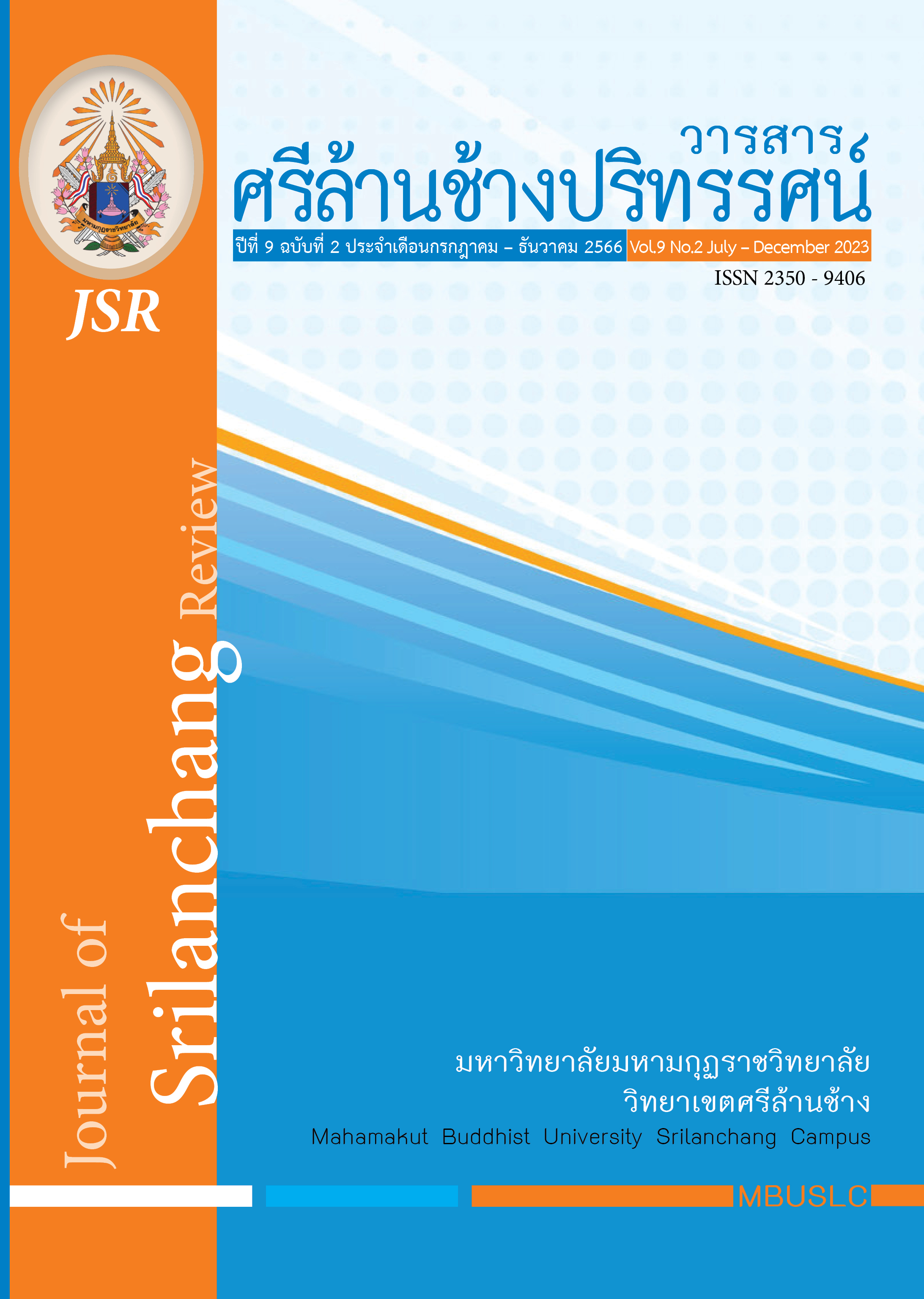GUIDELINES FOR SKILLS DEVELOPMENT OF SCHOOL ADMINISTRATORS IN THE 21st CENTURY UNDER LOEI PRIMARY EDUCATIONAL SERVICE AREA OFFICE 1
Main Article Content
Abstract
The objectives of the research were (1) to study the current condition and desired condition. And necessary needs and guidelines for skills development of school administrators in the 21st century under the Loei Primary Educational Service Area Office 1, (2) to study guidelines for developing skills of Educational institution administrators, and (3) to evaluate the guidelines for developing the skills of school administrators. The study was divided into 3 phases. The first phase was to study the current conditions, the desired conditions, and the priority needs. The sample group was a total of 302 respondents; consisting of thirty-four school administrators and 268 teachers, selected by Krejcie and Morgan sample size calculating table, including the stratified random sampling method. The research instrument used for data collection was a questionnaire. The second phase to study the guidelines comprised three steps; the first step on the in-depth interview of three school administrators as key informants with the semi-structured interview, the second step on drafting the guidelines, and the third step on the focus group discussion of nine experts to assess and confirm the guidelines. The third phase was to evaluate the guidelines by connoisseurship of five experts. The descriptive statistics used for data analysis comprised frequency distribution, percentage, arithmetic mean, standard deviation, and the modified priority needs index. The descriptive analytics was used for the qualitative data analysis. The research finding revealed that the current condition of the guidelines for developing the 21st century skills of school administrators under the Loei Primary Educational Service Area Office 1 was totally found at a high level. (x̅ = 3.82, SD = 0 .58). The desired condition was overall found at the highest level (x̅ = 4.77, SD = 0. 50). The modified priority index of essential needs, in the descending order of top three level, was (1) Digital technology (PNIModified = 0.36), (2) Creativity (PNIModified = 0.28), and (3) Innovation for learning (PNIModified = 0.26). The other finding disclosed that the guidelines for the 21st century skill development of school administrators under the Loei Primary Educational Service Area Office 1 consisted of five elements; (1) the Creative Initiatives with three methods, four projects, five activities, and nine practices, (2) the Digital Technology with three methods, six projects, three activities, and nine practices, (3) the Communication with three methods, four projects, five activities, and nine practices, (4) the Human Relations with three methods, two projects, seven activities, and nine practices, and (5) the Innovation for Learning with three methods, five projects, four activities, and nine practices, respectively. Another finding informed that the guideline evaluation results overall, it is at the highest level. (x̅= 4.78, SD = 0.41) Arranged from the mean from highest to lowest is the possibility side (x̅ = 4.78, SD = 0.41) Appropriateness aspect (x̅ = 4.75, SD= 0.42) and usefulness aspect (x̅ = 4.74, SD = 0.44).
Article Details

This work is licensed under a Creative Commons Attribution-NonCommercial-NoDerivatives 4.0 International License.
บทความที่ได้รับการพิจารณาจากคณะกรรมการผู้ทรงคุณวุฒิและเผยแผ่ในวารสารฉบับนี้ เป็นทัศนคติและข้อคิดเห็นส่วนบุคคลของผู้เขียนแต่ละท่าน ไม่ถือว่าเป็นทัศนะคติและความรับผิดชอบ
ของบรรณาธิการ
บทความ ข้อมูล เนื้อหา รูปภาพ ฯลฯ ที่ได้รับการตีพิมพ์ในวารสารศรีล้านช้างปริทรรศน์ ถือเป็นลิขสิทธิ์ของวารสารศรีล้านช้างปริทรรศน์ หากบุคคลหรือหน่วยงานใดต้องการนำทั้งหมดหรือส่วนหนึ่งส่วนใดไปเผยแพร่ต่อหรือเพื่อกระทำการใด ๆ จะต้องได้รับอนุญาตเป็นลายลักอักษรจากวารสารศรีล้านช้างปริทรรศน์ ก่อนเท่านั้น
References
กระทรวงศึกษาธิการ (2558). ผู้บริการในยุคปัจจุบัน. กรุงเทพฯ: สำนักงานคณะกรรมการการศึกษาขั้นพื้นฐาน.
กาญจนา ศิลา. (2566). การศึกษาภาวะผู้นำเชิงสร้างสรรค์ของผู้บริหารสถานศึกษาของโรงเรียน สังกัดกรุงเทพมหานคร สำนักงานเขตบางเขน. สารนิพนธ์ กศ.ม. (การบริหารการศึกษา). กรุงเทพฯ: บัณฑิตวิทยาลัย มหาวิทยาลัยศรีนครินทรวิโรฒ
การุณ สกุลประดิยฐ์. (2559). สพฐ.ชูโมเดลTEPE Online ลุยพัฒนาครู-บุคลากรศึกษา. ออนไลน์. สืบค้น 10 ตุลาคม 2563. แหล่งสืบค้น https://mgronline.com/daily/detail/9590000066241
ชัยยนต์ เพาพาน. (2559). ผู้บริหารสถานศึกษายุคใหม่ในศตวรรษที่ 21. ใน การประชุมวิชาการระดับชาติ
ครุศาสตร์ ครั้งที่ 1 การจัดการศึกษาเพื่อพัฒนาท้องถิ่น สู่ประชาคมอาเซียน: ทิศทางใหม่ในศตวรรษที่ 21. กาฬสินธุ์: มหาวิทยาลัยกาฬสินธุ์.
ชุมพร ภามนตรี. (2558). คุณลักษณะของผู้บริหารสถานศึกษาในศตวรรษที่ 21 ตามการรับรู้และความคาดหวังของครู สังกัดสํานักงานเขตพื้นที่การศึกษามัธยมศึกษา เขต 27. วิทยานิพนธ์ ค.ม. (การบริหารการศึกษา). ร้อยเอ็ด: บัณฑิตวิทยาลัย มหาวิทยาลัยราชภัฏร้อยเอ็ด.
ณัฐิกานต์ ปังศรีวงศ์. (2563) .การพัฒนาทักษะด้านการใช้เทคโนโลยีสารสนเทศและการสื่อสารเพื่อการจัดการเรียนรู้ในศตวรรษที่ 21 ของครูโรงเรียนตลาดหนองหวาย สังกัดสำนักงานเขตพื้นที่การศึกษาประถมศึกษาสุราษฎร์ธานี เขต 2. วิทยานิพนธ์ ค.ม. (การบริหารการศึกษา). สุราษฎร์ธานี: บัณฑิตวิทยาลัย มหาวิทยาลัยราชภัฏสุราษฎร์ธานี.
ประยุทธ์ จันทร์โอชา. (2562: 32). คำแถลงนโยบายของนายกรัฐมนตรี. สำนักเลขาธิการนายกรัฐมนตรี. ออนไลน์. สืบค้น 20 ธันวาคม 2564. แหล่งสืบค้น https://shorturl.asia/A5fsE
พรพิมล แก้วอุทัศน์. (2563). ทักษะการบริหารในศตวรรษที่ 21 ของผู้บริหารสถานศึกษา สังกัดสำนักงานเขตพื้นที่การศึกษาประถมศึกษาบุรีรัมย์ เขต 3 ตามทัศนะของครู. วิทยานิพนธ์ ค.ม. (การบริหารการศึกษา). นครราชสีมา: บัณฑิตวิทยาลัย มหาวิทยาลัยราชภัฏนครราชสีมา.
วิริยะ ฤาชัยพาณิชย์ และกมลรัตน์ ฉิมพาลี. (2559). ห้องเรียนแห่งอนาคต เปลี่ยนครูให้เป็นโค้ช!. กรุงเทพฯ:
ซีเอ็ดยูเคชั่น.
วิวัฒน์ บุญยง. (2557). ทักษะการบริหารของผู้บริหารที่ส่งผลต่อวัฒนธรรมองค์กรของโรงเรียนมัธยมศึกษาในจังหวัดนครปฐม. วิทยานิพนธ์มหาบัณฑิต, มหาวิทยาลัยศิลปากร).
สำนักงานเลขาธิการสภาการศึกษา (2557). วารสารวิจัยการศึกษา. 2(4). กรกฎาคม-กันยายน 2557.
สำนักงานเลขาธิการสภาการศึกษา (2560). แผนการศึกษาแห่งชาติ พ.ศ. 2560 – 2579. กรุงเทพฯ: บริษัท พริกหวานกราฟฟิค จำกัด.
อนุชิต วรรณสุทธิ์ (2546). การศึกษาคุณลักษณะผู้บริหารสถานศึกษามืออาชีพในอนาคต. วิทยานิพนธ์ ค.ม. (การบริหารการศึกษา). บุรีรัมย์: บัณฑิตวิทยาลัย มหาวิทยาลัยราชภัฏบุรีรัมย์
Cronbach, Lee J. (1990). Essentials of Psychological Testing. New York: McGraw-Hill.
Krejcie, R.V., & Morgan, D.W. (1970). Determining Sample Size for Research Activities. Educational and Psychological Measurement, 30(3), 607-610.
Likert, R.A. (1961, May). Technique for the Measurement of Attitudes. Arch Psychological, 25(140), 1-55.


